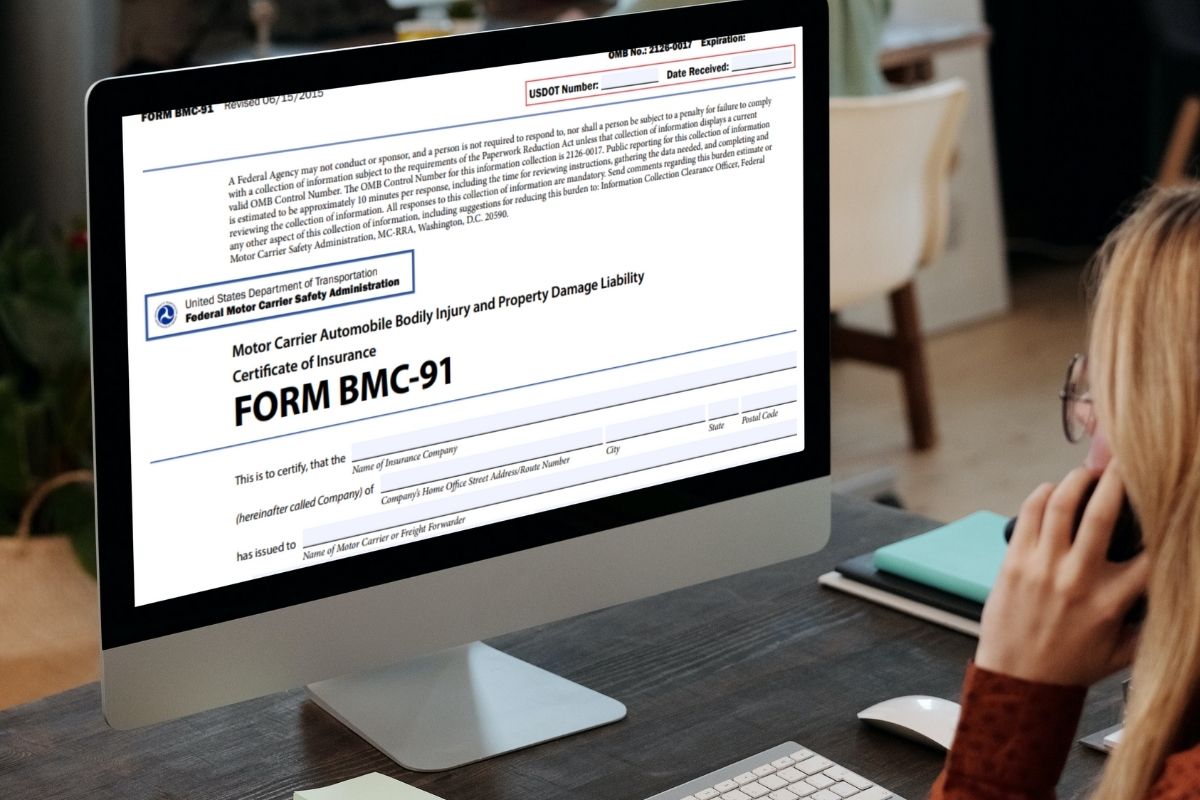What Is A BMC 91 Filing?
Truckers have to follow a number of federal and state regulations, and insurance filing is one of them. There are numerous filings needed for you to be compliant with federal and state regulations.
But the filings necessary to you all depend on the type of work you do. However, one of the most common filings required by federal law is the BMC 91 or BMC 91x filing.

But what exactly are these filings and why are they required? Well, we’re going to answer that question today!
We’ll also be explaining the difference between BMC 91 and BMC 91x filing, and who needs these filings so you know if they’re necessary for you. First though, let’s take a closer look at commercial trucking filings.
Breaking Down Commercial Trucking Filings
Highly valuable goods are moved all over the country every year, and so when truckers are driving across state lines there is a huge potential for liability.
So to verify that you have the correct liability insurance, you need to adhere to certain filing requirements, and this will differ depending on where you work and the nature of your job.
Transportation departments for federal and state law will have unique filing requirements, and if you cross state lines regularly in your job it can be confusing to know which filing is correct.
So let’s further define both federal commercial trucking filing and state commercial trucking filing so you know which one applies to you.
Federal Commercial Trucking Filing
If you regularly operate across state lines, haul dangerous cargo, or you take on in-hire work or for-hire passenger transportation you have to comply with federal commercial trucking filing.
There are some federally required filings that you don’t have to submit to the FMCSA. Instead these come with the insurance policy and are certified with a BMC 91 or BMC 91x filing.
A BMC 32 is also included in this. A BMC 32 is an endorsement that has to be linked to your cargo liability insurance to make sure you meet the threshold of coverage for cargo losses.
The MCS-90 is also included in this, and is an endorsement that makes sure you have the minimum amount required for public liability insurance.
If you do not travel over state lines or engage in intrastate trucking practices you do not need to have federal filings.
Furthermore, you don’t need federal registrations if you’re a farming or retail operator (i.e. a private carrier), an owner operator working under the authority of another entity, or a manufacturer.
State Commercial Trucking Filing
If you haul commodities that are not allowed in multiple states you will have to submit state fillings, as well as submitting federal requirements.
If your trucking company operates in just one state you will need state filing for the state you operate in, if filing is required in that state.
At the moment, these states are New Jersey, Pennsylvania, Maryland, Vermont, Florida, Wyoming, Nevada, Oregon, and Hawaii.
Your trucking company can also adhere to the Uniform Carrier Registration (UCR) Plan. This makes paying fees across multiple states easier by letting you submit financial responsibility information and the payment of registration fees to one state, and this is normally the state where your operations are based.
But this does not affect the regulations in that state, such as motor carrier financial responsibility laws. Depending on the state, further filing may be needed.
This process can also be made easier for commercial truckers with an interstate transportation liability program via your insurance provider.
Some insurance services offer a variety of insurance options for truckers across a number of states with their specialty trucking insurance programs.
What Is A BMC 91?
So what is a BMC 91 filing? Well, it is a federal filing linked to public liability insurance. This is also referred to as commercial auto liability insurance.
BMC 91 filing lets the FMCSA know that your company has the least amount of insurance required for your operation, so the risks of transporting goods from state to state are covered.
BMC 91 vs BMC 91x
Now let’s take a look at the difference between BMC 91 and BMC 91x filing. The biggest difference is that BMC 91x filing is needed if you have more than one insurance provider.
Do I Need To Have A BMC 91 Or BMC 91 x Filing?
BMC 91 or BMC 91x filing is not needed for every trucker. But if you transport or haul goods over state lines, if you run a for-hire trucking business and you transport goods for a fee, or if you’re hauling dangerous cargo then you are required to have BMC 91 or BMC 91x filing.
So if you believe a filing is necessary, you may be wondering who exactly submits this filing to the FMCSA?
This is usually the responsibility of your commercial auto liability insurance carrier, and if not them, then their chosen underwriter will submit these filings on your behalf. They are required to supply these forms, and they must be able to electronically submit this file to the FMCSA.
Final Thoughts
So while not every trucker is required to have BMC 91 or BMC 91x filings, it is likely that you will need this filing if you haul or transport across state lines.
If there is still anything you’re unsure of regarding this filing, you should contact your insurance agent as they can help you with your queries.
